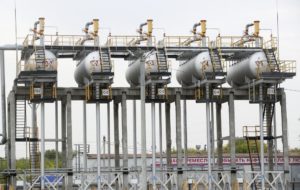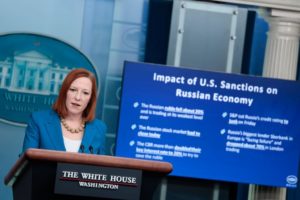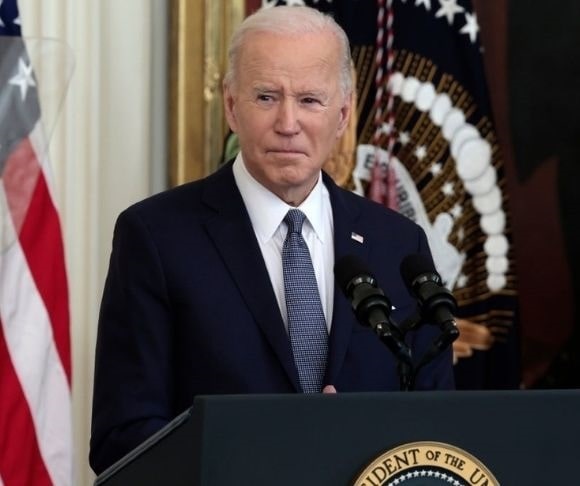The U.S. Treasury Department announced on Feb. 28 that it has cut off the Central Bank of Russia, the Ministry of Finance, and the Russian foreign investment fund from participating in U.S. dollar transactions. The latest update to financial sanctions will also restrict American individuals and businesses from executing trade with or on behalf of these parties. Foreign banks are banned from sending the greenback to the institution, finance ministry, and wealth fund. But Washington will allow an exception that is essentially the elephant in the room during the Ukraine-Russia crisis.
Russia’s Energy Sector Still Booming

(Photo by Yegor Aleyev\TASS via Getty Images)
U.S. officials confirmed that the Treasury would permit exceptions for energy-related payments to avoid additional spikes in global crude oil and natural gas prices. Washington has refrained from targeting Russia’s enormous energy sector out of fear of more tremendous inflationary pressures. But they insist that the financial sanctions applied on Moscow would substantially hurt the national economy.
A senior Biden administration official told reporters on a recent conference call that the current strategy is to ensure “the Russian economy goes backwards,” adding that “this is a vicious feedback loop that’s triggered by Putin’s own choices and accelerated by his own aggression.”
On the one hand, the ruble cratered more than 20% against the U.S. dollar to start the trading week. This resulted in the Russian central bank imposing a 10.5% emergency rate hike to cushion the sanctions’ blows, lifting the benchmark interest rate to 20%. On the other hand, oil and gas still generate more than one-third of the Kremlin’s revenues. With West Texas Intermediate (WTI) and Brent prices touching $100, Russia is enjoying immense profits, despite the international community condemning its actions.
Meanwhile, some jurisdictions have implemented tactics that would affect the Eastern European country’s energy sector. The United States has prevented Gazprom, the state-owned energy juggernaut, from raising funds on capital markets. Ursula Von der Leyen, the European Commission president, confirmed that the bloc would install an export ban preventing firms from sending technology to Russia to upgrade local refineries.
Critics contend that the lack of severe measures focusing on Russia’s key exports is emboldening President Vladimir Putin to sustain the invasion of his western neighbor. “We need real sanctions, not just some problems for Putin’s friends. We need an embargo on Russian gas and oil because every barrel of Russian oil and every cubic meter of Russian gas is now full of the blood of Ukrainians,” remarked Ukrainian lawmaker Oleksiy Goncharenko in a tweeted video.

Jen Psaki (Photo by Anna Moneymaker/Getty Images)
White House Press Secretary Jen Psaki told ABC’s This Week that renewable energy, not domestic output of fossil fuels, would be the solution to depending on foreign oil. Today, Russia supplies the United States with approximately 10% of its crude needs, which is significant when considering how tight the U.S. and global energy markets are in a post-pandemic economy of falling production and more renewables. “We need to reduce our dependence on foreign oil, on oil in general, and we need to look at other ways of having energy in our country and others,” she said.
Because of the growing number of countries applying economic pressure on Moscow, some foreign policy and market strategists purport that Putin could respond by withholding oil and natural gas. This could be a devastating knockout to the region since Europe’s energy inventories are below the five-year average. Plus, 40% of its oil purchases and 30% of its natural gas imports come from Russia. If Putin did so, financial analysts note energy prices would surge, with JPMorgan Chase estimating $150 a barrel.
President Joe Biden and the Democrats may also take a substantial hit in the polls since higher energy prices could lead to a much-anticipated red wave in the November midterm elections. The U.S. annual inflation rate stands at a 40-year high of 7.5%, and the consumer price index’s (CPI) vast growth has been broad. Whether the world homes in on Russia’s energy sector or Putin scales back shipments, the situation in Europe could trigger an inflationary event unseen in America’s modern history – and this would not bode well for the left’s political ambitions in 2022 and 2024.
Trump Was Right?
A video of former President Donald Trump has resurfaced. During a 2018 meeting with NATO Secretary General Jens Stoltenberg, Trump warned that the western military alliance is “totally controlled” by Russia through lucrative oil and gas agreements. “We’re supposed to protect you against Russia but they’re paying billions of dollars to Russia?” Trump questioned, “I think that’s very inappropriate.” Indeed, Liberty Nation has asked if conditions would be different if Trump were still president. On the energy front, it is a safe bet that he would tell the world to “drill, baby, drill” rather than depend on windmills to create power while simultaneously importing billions of dollars’ worth of energy from an enemy.
~ Read more from Andrew Moran.




